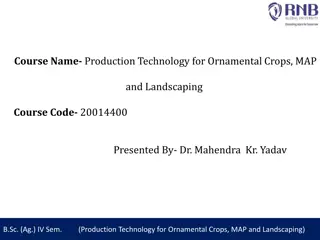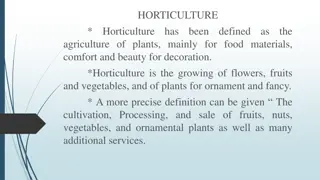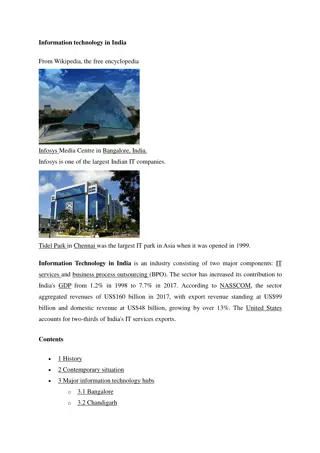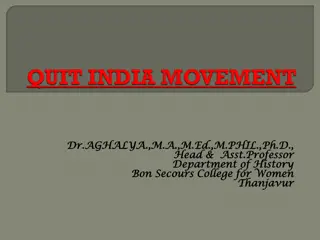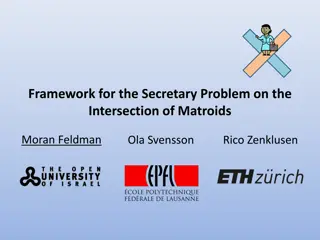Opportunities and Constraints in India's Floriculture Industry
India's floriculture industry offers vast opportunities due to its diverse agro-climatic conditions, geographical advantages, low labor costs, and government support. Various product-specific zones have been identified for selective development, with export potential to markets like Europe and East Asia. The implementation of international agreements like GATT has further boosted the industry, with tax exemptions and financial assistance available for exporters. Overall, the scope to enter the floriculture sector in India is extensive, promising high foreign exchange earnings and growth potential.
Download Presentation

Please find below an Image/Link to download the presentation.
The content on the website is provided AS IS for your information and personal use only. It may not be sold, licensed, or shared on other websites without obtaining consent from the author. Download presentation by click this link. If you encounter any issues during the download, it is possible that the publisher has removed the file from their server.
E N D
Presentation Transcript
SCOPE & CONSTRAINTS TO ENTER FLORICULTURE INDUSTRY IN INDIA MAMILLAPALLI.THRIVENI
SCOPE & CONSTRAINTS TO ENTER FLORICULTURE INDUSTRY IN INDIA
India has varied and dynamic agro-climatic condition suitable for floriculture India is geographically well located between two major markets that is Europe and East Asia. Winter being mild in India we can export flowers to temperate countries during the winter peak because of festival like Christmas, New Year day and Valentines Day. Labour cost is very low in India. The Govt. of India has identified floriculture as extreme focus thrust area for export during IX plan. The Govt. of India has identified product specific zones for selective development season, when the demand is in Contd
Products specific intensive floriculture zones: Product Zone Product 1. Area around Delhi, UP and Punjab 2. Area around Bangalore Rose, carnation, chrysanthemum, gladiolus Rose, ornamental foliage plants seeds carnation, chrysanthemum, 3. Area around Trivendrum Orchids, Anthurium and foliage plants 4. Area around Pune / Nashik Rose, carnation, gladiolus, dahlia, chrysanthemum, aster, tuberose 5. North including Sikkim Eastern region Orchids, Salvia, Anthurium and other foliage plants Lotus, tuberose, jasmine, chrysanthemum and Dahlia. Gladiolus, Liliums, Gerbera, 6. Area around Kolkata 7. Area around Srinagar Gladiolus, Liliums Carnation, Rose 8. Area around Solan, H.P. Gladiolus, other bulbous plants and seeds 9.Area around Coimbatore Jasmine, tuberose, chrysanthemum, rose, carnation-orchids including Nilgiris
With the implementation of GATT agreement European nations would bring down the import duty, which at present is 15 per cent. With international market growing at 8-10% and domestic market at 15-20 % hence the scope to enter floriculture industry is unlimited. Govt. of India is setting up the infrastructure for floriculture industry. APEDA is giving financial assistance to some extent for export of floriculture products. Easy bank finance
For 100 % export oriented units (EOUs) government has allowed sale of 50 per cent of production in domestic markets. 100 % tax exemption on implements / raw materials used in greenhouses for 100 % EOU s The rules and regulations related to import and exports have been minimized. Singapore have International standard flower auction centre, which is helpful for Indian exports. Floriculture products posses 25-30 time more foreign exchange earning ability than cereals or other agricultural products. The quality of water available for irrigation is acceptable in most of the cases.
Floriculture is capable of attracting and retaining a large number of progressive farmers / entrepreneurs. Ample sunlight and optimum temperature during winter means there is no need for artificial lighting or heating in green house production. APEDA and GOK have established four flower auction centers including one in Bangalore at a cost of Rs. 7 crores. Already a flower auction is working though on a small scale.
constraints/Problems/bottlenecks/hurdles/disadvant ages/drawbacks for floriculture industry Lack of specific information on area and production of different flowers is a handicap in planning production for domestic and export market. Lack of information on new / Ruling varieties continuously keep changing in international markets. Lack of information on modern practices like high density planting, fertilizer and irrigation management pp care, proper grading etc. Lack of infrastructure facilities. - Green house (Glass house, poly house) - Cold chain
Problems/constraints/bottlenecks/hurdles/disadvant ages/drawbacks for floriculture industry No direct flights (Cargo flights) from places like Bangalore and Pune which are main production centers results in double shipment increases cost and more scope for spoilage. The freight rates in India are high which makes products uncompetitive in international markets. There are no organized marketing co-operatives of other bodies which can take care of floriculture trade in India. Lack of Research and development in floriculture. New varieties, post-harvest techniques, modern cultivations method etc. It is a continuous process.
Problems/constraints/bottlenecks/hurdles/disadvant ages/drawbacks for floriculture industry No detailed economic feasibility studies with reference to establishment, maintenance and cost of production in glass house conditions / protected cultivation. Plats in soil based container medium not allowed in most middle-cast and European markets so peat moss, perlite and rock wool mediums research and cost. Lack of streamlined quality control mechanism and poor co- ordination between govt. agencies involved in import and export of floriculture products. Exemption from import duty by importing countries (15%) Some countries like Columbia Mauritius etc are exempted.- Government level talks needed.
Problems/constraints/bottlenecks/hurdles/disadvant ages/drawbacks for floriculture industry Phytosanitory certificates are given only in selected cities like Delhi, Kolkata, Mumbai and Madras. Lack of appropriate planting material and production technology for export lack of knowledge about importing and exporting countries. No. regular cargo flights from India Indian mentality - lack of quality consciousness - Cheating This affects floriculture industry as a whole. Lack of our sale promotion activities in importing countries. Lack of training facilities in high tech production technology. Lack of market intelligence (international) Eg: - varieties, selling rates


![Read⚡ebook✔[PDF] Life in the Universe: Expectations and Constraints (Springer P](/thumb/21626/read-ebook-pdf-life-in-the-universe-expectations-and-constraints-springer-p.jpg)


